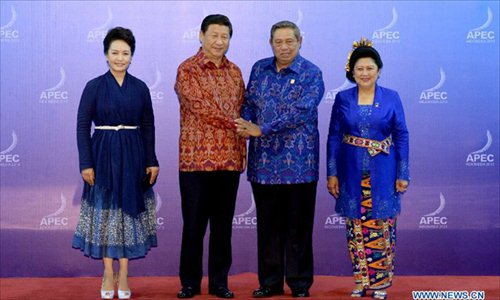Xi-Siew APEC meeting hopeful signal for cross-Straits development

Chinese President Xi Jinping (2nd L) and his wife Peng Liyuan (1st L) pose for a photo with Indonesian President Susilo Bambang Yudhoyono (2nd R) and his wife before a dinner hosted for the leaders and their spouses at the 21st APEC Economic Leaders' Meeting in Bali, Indonesia, Oct. 7, 2013. Photo: Xinhua
Chinese President Xi Jinping met Vincent Siew, honorary chairman of the Taiwan-based Cross-Straits Common Market Foundation, on the sidelines of the Asia-Pacific Economic Cooperation (APEC) forum in Indonesia on Sunday. Xi said that "enhancing cross-Straits political mutual trust and consolidating common political foundation are vital to ensure the peaceful development of cross-Straits relations."
In addition, there was a symbolic encounter between Zhang Zhijun, head of the Taiwan Affairs Office of the State Council, and Wang Yuqi, Taiwan's top official on Chinese mainland affairs, which further released hopeful signals that the cross-Straits political interaction will be updated through administrative procedures step by step.
The meeting demonstrated that continual political interactions between the mainland and Taiwan are seeing sound momentum.
A groundbreaking visit to the mainland by former chairman of the Kuomintang (KMT) Lien Chan in 2005, during which he met then Chinese president Hu Jintao, started the cross-Straits political communications. Political relations have further developed since the KMT came to the office in 2008.
Honorary Chairman of KMT Wu Po-hsiung suggested using the "one China" framework in determining cross-Straits relations when he held talks with Xi in Beijing in June.
Despite different interpretations on "one China" between the mainland and Taiwan, mutual political trust based on the "1992 Consensus" has been established.
For many years, the APEC forum has been a platform for information change across the Straits.
Wang's participation in the meeting as Taiwan's top official in charge of mainland affairs broke the previous confinement that only officials in charge of economic affairs could be allowed in cross-Straits meetings during APEC forum.
This has a strong symbolic political significance. Moreover, such arrangements were proposed by Taiwan first and received a positive response from the mainland, showing enhanced mutual trust across the Straits in the international arena.
Cross-Straits economic and trade relationship concentrated on their bilateral nature in the past. However, economic cooperation across the Straits is now focusing more on promoting a global free trade system and regional integration.
This will be the future trend and calls on both sides to make efforts in strengthening cooperation.
During the APEC meeting, Xi stressed both the mainland economy and Taiwan economy are part of the economy of the Chinese nation.
And Siew came up with the idea of establishing a "cross-Straits common market" as early as in 2001.
These in fact point to the importance of building regional strategic consensus across the Straits at the backdrop of regional integration.
The APEC forum is the ideal international occasion for the mainland and Taiwan to demonstrate their common goal in cementing economic cooperation.
Since the KMT won election again, a total of 19 agreements have been signed between the mainland and Taiwan in the past five years.
Although political disputes emerged around a cross-Straits service trade agreement signed in June, this doesn't overshadow the two sides' fruitful relationship in recent years.
Instead, it warns us that a balanced development between economic relations and political relations should be kept when handling the complexity of the cross-Straits relations.
With the mainland and Taiwan further opening their markets based on WTO regulations, with the deepening of ECFA and further liberalization of cross-Straits economic and trade relations, the mainland, Taiwan and Hong Kong, as members of APEC, will witness quick integration in areas as diverse as consumption, investment, trade and market. Industrial integration will also be sped up.
There have already been many good examples of industrial integration in the Pearl River Delta region and the Yangtze River Delta region. The buildup of the Shanghai Pilot Free Trade Zone and the Kaohsiung Free Trade Zone will further accelerate the integration process.
In the post-financial crisis era, the mainland and Taiwan face not just challenges, but abundant opportunities to contribute more to the Chinese national economy at a broader perspective.
The author is a researcher of the Institute for Taiwan, Hong Kong & Macao Studies at Shanghai Institutes for International Studies. opinion@globaltimes.com.cn